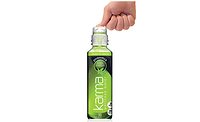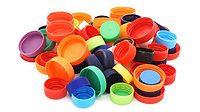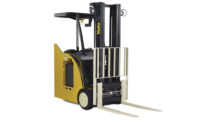SKU proliferation, customization trends impacting caps and closures
Beverage-makers use caps and closures to convey branding


Closure Systems International’s Extra Lok V 38-mm ODU universal closure is lightweight and easy to open, the company says. (Image courtesy of Closure Systems International)


Closure placement in bottling might be at the end of the line, but if you overlook the smallest of marketing billboards, manufacturing and product sales could fall flat from the start. The drink won’t fly off the shelf if a cap is too hard to open, a bad seal causes degradation, or powdered flavoring or additives don’t mix correctly.
Beverage manufacturers and their partner closure suppliers are meeting today’s consumer needs for a customized end product that’s on brand, easy to use, and at a lower price point. Success starts with the right solution, and many product preservation factors and cap styles need to be considered for closures to accommodate needs of the manufacturer and ultimately the end consumer, says Sheila Heath, director of marketing for Crown Closures North America, a business unit of Crown Holdings Inc., Philadelphia.
Crown’s metal Pressed Twist (PT), or one-opening, closure is most used on coffees and teas, but Crown’s composite closure, which is a metal disk with a plastic band, can replace the PT closures for these retort beverages. “A lot of technical details are involved in a cap [decision], but when a manufacturer comes to us, we first need to know what is in the inside of the glass container and make sure the closure coating systems are compatible,” Heath says. “Many times, the processing dictates the closure.”
Prior to closure selection, the company asks several questions to ensure that the interior coating systems and the closure style are compatible with the product inside the container. Among the questions are the type of product, fill temperature, packing or processing method, cap application method and conditions, the product’s pH, and any preservatives that might be present.
The distribution channel is yet another variable that can influence a brand’s packaging-format decision. “Not all outlets have multi-packs with metal closures and glass containers,” Heath says. “The point of sale used by [the beverage manufacturer] for the product will dictate the package [and the closure] they want.”
Easy does it
For beverages, closures can be important to keep what is inside fresh and germ free once in market, but they still need to provide the end user functionality. Ease of use with a bottle seal or cap also can be crucial when working out or playing sports, and reclosable caps that keep liquids from spilling can be important for busy parents with kids in the back seat.
More than a decade ago, Aptar Food + Beverage introduced a flip-top, or hinged, sports drink closure to the beverage market. The Crystal Lake, Ill.-based company more recently launched a sport closure that uses its low-profile 1881 neck finish, making it lighter and more sustainable. Both sport cap products allow for one-handed opening, capitalizing on the convenience trend.
“The caps appeal to more on-the-go adults and children, who more and more frequently drink and snack while on the road or outside of the house,” says Jean-Marc Philbois, global market development leader and beverage president at Aptar.
Philbois also emphasizes the importance of finding the right balance when considering sustainability principles and convenience. “Closure manufacturers must find a balance between light-weighted solutions and consumer convenience,” he says. “For example, if a closure is only a couple grams in weight, it may be ideal for the environment, but if the consumer — especially children and the elderly — are unable to open the package then … frustrated consumers will most likely switch to an alternative brand.”
Aptar’s closure advances are compatible with its SimpliSqueeze valve technology, which is designed for liquid water enhancers, Philbois says. The combination creates a spill-proof package for brands that targets children, he says. Its newest sport closure, Contender, creates even more consumer convenience because it does not incorporate a foil liner because it is not necessary for hot-fill bottling applications, he adds.
“Aptar has helped better-for-you beverages commonly filled aseptically to provide convenience for consumers and differentiate their brands,” Philbois says. “Similar to Contender, Asepta does not require a foil liner, which is an improvement to many dispensing closures on market.”
In addition to consumer convenience trends, Closure Systems International (CSI), Indianapolis, is focused on wellness and increased product integrity to drive new closure development, according to Jane Haywood-Rollins, global marketing services manager for CSI.
“CSI has developed and continues to work on closure solutions for healthy beverages and foods in addition to enhancing package safety and security,” Haywood-Rollins says.
Advances span the company’s portfolio of plastic and aluminum closures, which serve many different beverage industries, including carbonated soft drinks (CSDs), bottled water, juices, sports drinks, teas, adult beverages and liquid dairy products. CSI’s closure diameters for standard and non-standard bottle finishes include one-piece liner-less and two-piece lined designs.
CSI also offers its Extra Lok V 38-mm ODU “universal” closure, which can help bottlers reduce their total cost of operations in several ways, Haywood-Rollins says. The closure is lightweight and versatile because of its ability to securely seal both PET and high-density polyethylene bottles with varying bottle finish wall thicknesses, making it ideal for hot-filled, cold-filled and aseptically filled non-carbonated and liquid dairy products, the company says. It also offers energy-saving, no-steam application for improved capping efficiency and provides consistent, easy-to-open removal torques, it adds
The Asepti-Lok V 38-mm 3S LF closure with venting properties for aseptically filled beverages prevents blow-off, which is another consumer benefit. In addition, CSI launched earlier this year its 1.9-gram Omni mini XP 28-mm cap, which is one of the lightest, highest-performing CSD closures available, the company says. Omni mini XP’s carbon dioxide performance and improved impact performance keep the product fresh and protect customer brand integrity, she says.
Caps mix it up
Sport caps such as Aptar’s Contender closure and CSI’s Sports-Lok APC 28-mm closure meet the demands of today’s highly mobile, on-the-go consumers. However, sometimes the end consumer wants a customized combination of ingredients that might not form a shelf-stable beverage when mixed prior to market. This is where dosing caps come into play and give younger consumers the custom beverage experiences they crave.
Liquid Health Labs, Deerfield, N.H., offers three different styles of dosing caps under its PowerCap brand. In 2011, it introduced the PowerCap Universal to fit any water bottle. Today, it promotes its Three Caps Program, which includes PowerCap Push, PowerCap Twist and PowerCap Universal. Each of the company’s dosing-style caps is eco-friendly and 100 percent recyclable.
The company offers dosing cap technology for various markets such as sports and fitness, health and wellness, over-the-counter and pharmaceutical, and consumer goods. But the company considers itself a mixing solutions company, partnering with supply chain partners to provide a market-ready solution. Whether it’s using existing core technologies or a custom design, PowerCap works with manufacturers from full product concept to finished product for market launch, according to Derek Hopkins, president of PowerCap.
“[Manufacturers] are focused on continued growth for fresh, natural, stable products,” Hopkins says. PowerCap provides packaging solutions that meet the needs of people who are mixing and consuming things fresh at the point of consumption, he adds.
PowerCap is proactive in testing PowerCap technology in the market and shares research with its partners from its market launches such as Fresh Healthy Stuff…in the Cap and Last Shot. “We are trying to drive the leg work [to show companies how to] do things outside of the core business to prove things out,” Hopkins says.
An example of this is an initiative PowerCap has begun with Fortitech Premixes by DSM. Through this association, the company hopes to provide manufacturers with product development and formulation support and manufacturing of market-ready powdered beverages that are compatible with the PowerCap technology. “Through this collaboration, we are able to benefit from their premix formulations combined with their innovative proprietary ingredient portfolio to create turn-key, market-ready products,” he says.
The offering further expands the company’s ability to get innovative products to market faster with fewer hurdles, Hopkins adds.
Whether it’s branding or appealing to new market segments and responding to product proliferation, brand owners will rely on packaging, including the closure, for differentiation and added customization.
Standing out from the crowd
The beverage aisle offers myriad choices, colors, sizes and regular promotions to draw consumers in with splashy graphics and messaging on the bottle label. But cap and closure designs also can help a new product or campaign stand out.
In the business of metal caps and closures, the most notable innovation isn’t related to size, shape or even composition. Trends in what is imprinted on the metal closure is what really draws attention, according to Sheila Heath, director of marketing for metal closures and specialty packaging for Crown Closures North America, a business unit of Crown Holdings Inc., Philadelphia.
Caps are like a billboard, she says. Brands can use imagery, logos or even quick-response codes printed on the interior or exterior of the cap to reinforce messaging, branding and promotions, Heath explains. And it all can be done in house.
“Crown assists to not only provide the closure, but we can also provide design and tweak colors to get the exact right theme and digital file onto the enclosure,” she says.
Beverage-makers partnering with Closure Systems International (CSI), Indianapolis, also can have custom closures or brand-specific closures developed that stand out on shelf and enhance branding. Its solutions appear in non-alcohol beverages, alcohol beverages and food markets, according to the company.
“CSI uses a disciplined innovation process, including consumer research, to deliver closure and packaging solutions with advanced decoration and functionality,” says Jane Haywood-Rollins, global marketing services manager for CSI. “Incorporating custom colors, custom shapes, custom textures, custom graphics [and] custom promotions helps brand owners differentiate their products, enhance consumer satisfaction, and provide eye-catching shelf impact.”
Looking for a reprint of this article?
From high-res PDFs to custom plaques, order your copy today!










